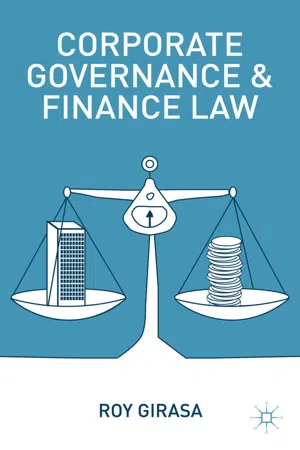Law
Corporate Finance law
Corporate finance law encompasses the legal regulations and principles that govern the financial activities of corporations. It covers areas such as capital structure, financing, mergers and acquisitions, and corporate governance. This body of law aims to ensure transparency, fairness, and accountability in corporate financial transactions and decision-making.
Written by Perlego with AI-assistance
Related key terms
1 of 5
6 Key excerpts on "Corporate Finance law"
- No longer available |Learn more
- (Author)
- 2014(Publication Date)
- College Publishing House(Publisher)
Corporate law is often divided into corporate governance (which concerns the various power relations within a corporation) and corporate finance (which concerns the rules on how capital is used). _____________WORLD TECHNOLOGIES_____________ Corporate law in context Definition The word corporation is generally synonymous with large publicly owned companies. In the United States, a company may or may not be a separate legal entity, and is often used synonymously with firm or business. A corporation may accurately be called a company; however, a company should not necessarily be called a corporation, which has distinct characteristics. According to Black's Law Dictionary, in the U.S. a company means a corporation — or, less commonly, an association, partnership or union — that carries on industrial enterprise. The defining feature of a corporation is its legal independence from the people who create it. If a corporation fails, its shareholders will lose their money, and employees will lose their jobs, though disproportionately affecting its workers as opposed to its upper executives. Shareholders, however owning a part piece of the company, are not liable for debts that remain owing to the corporation's creditors. This rule is called limited liability, and it is why corporations end with Ltd. (or some variant like Inc. and plc). In the words of British judge, Walton J, a company is... ...only a juristic figment of the imagination, lacking both a body to be kicked and a soul to be damned. But despite this, corporations are recognized by the law to have rights and responsibilities like actual people. Corporations can exercise human rights against real individuals and the state, and they may be responsible for human rights violations. Just as they are born into existence through its members obtaining a certificate of incorporation, they can die when they lose money into insolvency. Corporations can even be convicted of criminal offences, such as fraud and manslaughter . - eBook - ePub
- R. Girasa(Author)
- 2013(Publication Date)
- Palgrave Macmillan(Publisher)
It is anticipated that this area of the law is and will continue to be “hot” over the next decade with the likelihood of additional legislative enactments. It is incumbent upon all students entering the business world to have at least an awareness of the law affecting their activities. Senior officers are now required, in most instances, to ensure that there are systems in place to detect fraud and other wrongful acts or omissions in which they have been personally involved or whose existence they know of. Contents of the Text Deciding which subjects and their subcategories to include, as well as the degree of attention to be paid to them, in a text on the law of finance is necessarily subjective. Authors of various texts tend to emphasize the areas of law of their expertise and may ignore or inadvertently deemphasize subjects that are important for the reader. Although this author is aware of the pitfalls of making choices, it is suggested that the sequence of the subjects covered be as stated hereinafter. Due to the size of the initial text, which consisted of 14 chapters, it was decided that the subject matter be divided into two volumes of six and eight chapters respectively. The first volume (this text) is entitled Corporate Governance and Finance Law. It is divided into two sections; the first section covers corporate governance, which includes a detailed examination of securities laws. Included in the discussion are an introduction to the outline of the text; a review of the basic forms of doing business; a discussion of corporate governance; an examination of the impact of recent federal legislation particularly as they affect corporate governance; and an examination of other basic forms of corporate governance globally. In this chapter, the basic legal forms of doing business are reviewed - No longer available |Learn more
- (Author)
- 2014(Publication Date)
- Orange Apple(Publisher)
____________________ WORLD TECHNOLOGIES ____________________ Chapter- 4 Corporate Law Corporate law (also company or corporations law) is the law of the most dominant kind of business enterprise in the modern world. Corporate law is the study of how shareholders, directors, employees, creditors, and other stakeholders such as consumers, the community and the environment interact with one another under the internal rules of the firm. A major contributor to company law in the Uk is the companies act 2006. Corporate law is a part of a broader companies law (or law of business associations). Other types of business associations can include partnerships (like most law firms. In the UK partnerships are governed by the Partnership Act 1890 ), or trusts (like a pension fund) or companies limited by guarantee (like some universities or charities). Corporate law is about big business, which has separate legal personality, with limited liability or unlimited liability for its members or shareholders, who buy and sell their stocks depending on the performance of the board of directors. It deals with the firms that are incorporated or registered under the corporate or company law of a sovereign state or their subnational states. - eBook - PDF
Corporate Governance in Nigeria
Current Practices and Emerging Trends
- Bello Marshall(Author)
- 2020(Publication Date)
- Malthouse Press(Publisher)
Chapter 5 Legal Framework of Corporate Legal Framework of Corporate Legal Framework of Corporate Legal Framework of Corporate Governance in Nigeria Governance in Nigeria Governance in Nigeria Governance in Nigeria This chapter discusses the legal framework of corporate governance in Nigeria and in so doing; it examines relevant legislation on corporate governance with a view to ascertaining the effectiveness or otherwise of the laws obtainable in Nigeria. The main purpose of legislation for corporate governance is to monitor and mitigate the risks of fraud, mismanagement and other forms of misdeeds by management of corporations in running the affairs of companies. That is to say, corporate governance as a concept presupposes the existence of legal mechanisms or regulation both internally and externally in order to achieve corporate objectives of companies. It is the laws of a country that determines whether or not foreign capital would flow since foreign investors are not willing to invest in a country where the legal framework for the protection of investment is weak. The expectation is that statutory regulations having a touch of command receive higher degree of compliance than self-regulation. Corporate governance is strongly dependent on the larger environments within which companies operate; these consist of the legislative environment such as shareholder protection laws; the efficiency and enforcement capabilities of the judiciary; as well as the general environmental support for business. Udayasakar and Das argue that these can cumulatively be regarded as corporate governance regulation. - eBook - PDF
Hedge Fund Activism in Japan
The Limits of Shareholder Primacy
- John Buchanan, Dominic Heesang Chai, Simon Deakin(Authors)
- 2012(Publication Date)
- Cambridge University Press(Publisher)
20 3.1 Introduction Our analysis in this book focuses on companies and the processes by which they are governed. The terms ‘company’ (or in some jurisdic- tions ‘corporation’) and ‘corporate governance’ are, however, ambigu- ous and contested. Our aim in this chapter is to clarify their meaning and to set out how we intend to use them. We first highlight the dis- tinction between two distinct, if intertwined, notions: one is the legal form, the ‘company’, which facilitates and underpins concerted com- mercial activity; the other is the social and economic structure, the ‘business firm’ or ‘business enterprise’, through which production is organised. The term ‘company’ is widely (and to some degree unavoid- ably) used in both senses, but the two meanings are distinct (Robé, 2011). Failure to distinguish between them, or to be clear about which of them is being used in a given context, is a source of confusion in the corporate governance literature, particularly when the role of the law in shaping corporate activity is being described. This observation leads on to our second aim in this chapter which is to specify the nature of the relationship between company (or corpor- ate) law and corporate governance. Company law provides an account of the business enterprise which is in significant respects incomplete. The way that company law describes business firms is not necessarily a good guide to the way that they operate as social or economic organi- sations. Corporate activity and behaviour is shaped, beyond the law, by institutionalised practices of varying degrees of formality. These practices can fill in the gaps left by legal rules and thereby comple- ment their operation, but they can also, on occasion, defeat their pur- pose, or otherwise render them ineffective. The law is just one part of that wider set of routines, norms, and rules which make up ‘corporate governance’ in the context of a given national system or individual enterprise. - Marc Moore(Author)
- 2013(Publication Date)
- Hart Publishing(Publisher)
14 Defining Corporate Governance checked, counterbalanced, or otherwise rendered legitimate from the per -spective of those who are subject to the powers in question. 7 Correspondingly, corporate governance can be defined as the social problem of holding powerful decision-makers in large economic organisa -tions accountable for their actions, in order to legitimate their continuing possession and exercise of power. Therefore, in the same way that consti -tutional and administrative law seek to achieve this outcome within the public governmental domain, corporate law (or, at least, those aspects of corporate law concerned with governance matters) is designed to ensure that the powers and decisions of key economic functionaries in the pri -vate sector are in general acquiesced in by those persons who are princi -pally affected by them. Given the extent to which corporate governance issues pervade the gen -eral field of corporate law today (especially in the US), it is not uncommon for the terms ‘corporate (or company) law’ and ‘corporate governance’ to be used in an almost interchangeable manner. However, it is not my inten -tion to do this in the present book. Rather, I understand the specific field of corporate governance law, at least as it is known in the Anglo-American environment, to refer only – or at least substantially – to the legal and other institutional components that comprise the corporate equity relation : that is to say, the so-called ‘agency’ relationship between the management and ordin-ary shareholders of a public or widely-held corporation. 8 I fully acknowledge that a considerable proportion of the broader field of corporate (or company) law exists principally to safeguard the interests of unsecured creditors and other potentially vulnerable ‘third parties’ in society, whose incentives are on occasion misaligned with those of share -holders and – consequently – managers.
Index pages curate the most relevant extracts from our library of academic textbooks. They’ve been created using an in-house natural language model (NLM), each adding context and meaning to key research topics.





